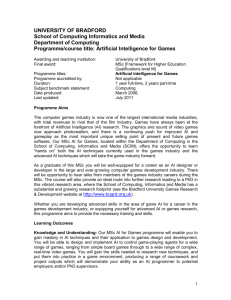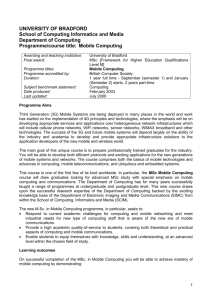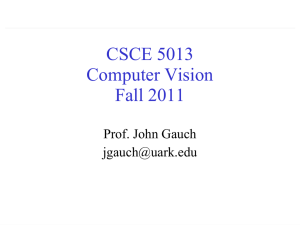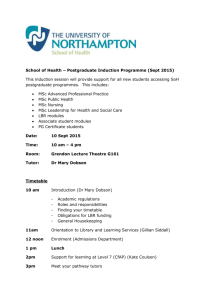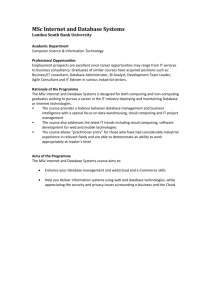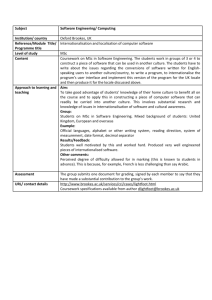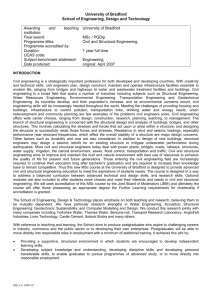MSc Visual Computing
advertisement
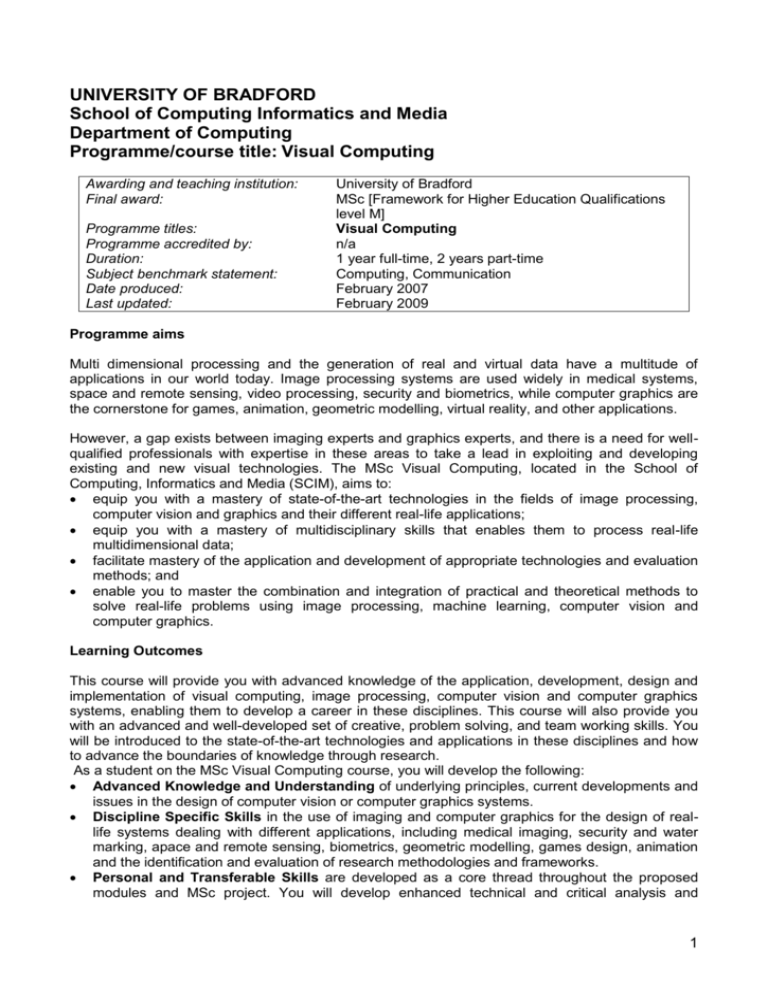
UNIVERSITY OF BRADFORD School of Computing Informatics and Media Department of Computing Programme/course title: Visual Computing Awarding and teaching institution: Final award: Programme titles: Programme accredited by: Duration: Subject benchmark statement: Date produced: Last updated: University of Bradford MSc [Framework for Higher Education Qualifications level M] Visual Computing n/a 1 year full-time, 2 years part-time Computing, Communication February 2007 February 2009 Programme aims Multi dimensional processing and the generation of real and virtual data have a multitude of applications in our world today. Image processing systems are used widely in medical systems, space and remote sensing, video processing, security and biometrics, while computer graphics are the cornerstone for games, animation, geometric modelling, virtual reality, and other applications. However, a gap exists between imaging experts and graphics experts, and there is a need for wellqualified professionals with expertise in these areas to take a lead in exploiting and developing existing and new visual technologies. The MSc Visual Computing, located in the School of Computing, Informatics and Media (SCIM), aims to: equip you with a mastery of state-of-the-art technologies in the fields of image processing, computer vision and graphics and their different real-life applications; equip you with a mastery of multidisciplinary skills that enables them to process real-life multidimensional data; facilitate mastery of the application and development of appropriate technologies and evaluation methods; and enable you to master the combination and integration of practical and theoretical methods to solve real-life problems using image processing, machine learning, computer vision and computer graphics. Learning Outcomes This course will provide you with advanced knowledge of the application, development, design and implementation of visual computing, image processing, computer vision and computer graphics systems, enabling them to develop a career in these disciplines. This course will also provide you with an advanced and well-developed set of creative, problem solving, and team working skills. You will be introduced to the state-of-the-art technologies and applications in these disciplines and how to advance the boundaries of knowledge through research. As a student on the MSc Visual Computing course, you will develop the following: Advanced Knowledge and Understanding of underlying principles, current developments and issues in the design of computer vision or computer graphics systems. Discipline Specific Skills in the use of imaging and computer graphics for the design of reallife systems dealing with different applications, including medical imaging, security and water marking, apace and remote sensing, biometrics, geometric modelling, games design, animation and the identification and evaluation of research methodologies and frameworks. Personal and Transferable Skills are developed as a core thread throughout the proposed modules and MSc project. You will develop enhanced technical and critical analysis and 1 problem solving skills. You will also be able to refine your writing, presentation, team working and time management skills. The Curriculum The postgraduate programme in Visual Computing covers a range of specialist topics, leading to a qualification of the Master's degree (the detailed course structure is shown in the following section). The programme is structured to take one academic year for full-time students and two academic years for part-time students. Part-time students are required to agree their timetables with their Course Tutors at the beginning of every semester. This course has two stages—the taught course stage (which takes up most of the first two semesters), and the project/dissertation stage—and is organised on a modular basis. Modules are usually examined or assessed at the end of the semester in which they are taught. After successful completion of the taught modules you will proceed to work on a project in your chosen area of specialisation. This will be submitted along with a dissertation of 10,000 words. Note that the taught course stages are September to January (semester 1) and then January to May (semester 2), and the project/dissertation stage is May to September. Course Structure Credits Semester Level MSc Visual Computing CM1003D 20 1 M Software Development (PG) C EM4053D 20 1 M Computer Animation C EM4027D 20 1 M Computer Vision Systems C EM4015M 10 2 M Research Skills and Methodologies C CM1044D 20 2 M Artificial Intelligence with Applications O EM4043M 10 2 M Digital Image Processing Systems C EM4044D 20 2 M Computer Graphics and Systems C CM1010D 20 2 M Software Engineering O EM4050Z 60 DISS M Visual Computing MSc Project C = Core O = Option C Module code Module title MSc The curriculum may change, subject to the University's course approval, monitoring and review procedures. Learning, Teaching and Assessment strategies You experience a range of teaching and learning environments. Concepts, principles and theories are generally explored in formal lectures, demonstrated in laboratory classes, and practised in associated tutorials and seminars. Practical skills are developed in labs. Professional and personal skills are developed through discussion, presentations and small-scale project work which involve problem-solving and design exercises, often by working in small groups. A particular strength of this course is the contribution made to the teaching programme by successful research-active members 2 of staff. You will be introduced to real-life applications in the fields of visual computing, image processing, computer graphics and computer vision. These applications will cover different aspects of computer animation, satellite imaging, artificial intelligence, medical imaging, robotics, virtual reality and others. Practical examples covering state-of-the-art research and technologies in the related topics will be introduced to you. This will increase the employability and work readiness of graduates in the related fields. It will also support the UK’s competitiveness in these disciplines. Each 10-credit module on the course requires 100 hours of study. Some of these hours will be formally timetabled lectures, laboratories, seminars, tutorials and workshops, while others will involve carrying out private study by students. Methods of assessment are similarly varied and your progress will be assessed using a mix of formal examinations, presentations and seminar papers, reports, laboratory tests, coursework assignments, and projects. The appropriate method is chosen to reflect the particular learning outcomes of each module. The School is committed to Education for Sustainable Development (ESD) and endeavours to integrate ESD wherever possible into the curriculum. Assessment Regulations Comprehensive information about the University of Bradford’s Regulation Governing Postgraduate Taught Courses is available on the web at http://www.brad.ac.uk/admin/acsec/QA_Hbk/Postgrad_Taught_Regs.html Admission Requirements Generally, applicants are expected to possess a good Honours degree (normally 2:2 or above) in an area relevant to their proposed programme of study from an approved degree-awarding body, or have a good Honours degree in any subject together with skills and experience in a relevant area. Candidates applying to the course with non-standard qualifications will be judged on an individual basis using the University’s APEL procedures. In addition, a test of written and spoken English normally needs to have been passed at grade 6.0 for IELTS or 550 for TOEFL (or 250 for the computer-based test). Student Support and Guidance All students admitted to the School of Computing, Informatics and Media go through a process of induction that includes detailed talks by the Dean and Head of Department. Afterwards, ongoing support for students is provided in the form of one-stop facilities located at the School of Computing, Informatics and Media Student Support Office (SSO) in Horton Building open throughout the day during term, and in the mornings and afternoons outside term. Support for registered students also is provided 24/7 via the School of Computing, Informatics and Media intranet. This includes the SSO website at http://www.inf.brad.ac.uk/internal/sso/ with information on: SCIM Student Handbook SCIM Learning & Behaviour Agreement Course Timetable Examination timetable Answers to Frequently Asked Questions (FAQs) 3 Coursework submission record E-mail Archives The School’s intranet and website also offers information to support students, including: Student Staff Liaison Committee Minutes Courses and modules Course Tutors contact information Finally, the School’s intranet includes the Technical Support website at http://ts.inf.brad.ac.uk/ which supports students by offering detailed information on all the technical and services offered by the School, including: Digital Arts Centre Equipment Loans Service IT suites Video Editing Hosting You will be allocated a Personal Tutor who provides support and guidance on matters relating to learning, teaching, and your academic progress, pastoral support and personal development planning (PDP). There are tutors in the School who deal with issues where other social factors (relating to gender or disability for example) may have an impact on a student’s academic performance. The Student Staff Liaison Committee gives the opportunity for students to give formal feedback to the Course Tutor and/or department about curricular issues and the general running of the programme. The School also uses the University’s Virtual Learning Environment (VLE) known as Blackboard to support students via their individual modules. The University of Bradford provides important facilities such as extended access to library and computing services, counselling and welfare services, and careers advice. The Disability Office provides targeted support for all students with known disabilities and routinely arranges dyslexia assessments and appropriate support (i.e. reasonable adjustment) for disabled students. Further Information More details about our MSc Visual Computing may be obtained from the School of Computing, Informatics and Media Admissions Office via telephone on 00 44 1274 234286, e-mail msc@inf.brad.ac.uk, or our website at www.scim.brad.ac.uk/courses/pg/ . If you require further information about the University of Bradford, please refer to its Postgraduate Prospectus. Disclaimer The details of this Programme Specification and information contained therein are subject to change in accordance with the University of Bradford’s course approval, monitoring and review procedures. 4

